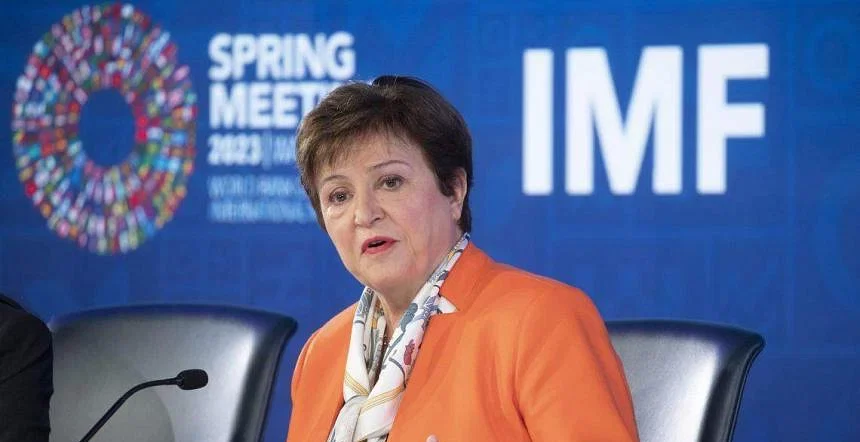The International Monetary Fund (IMF) has released a comprehensive staff report assessing Egypt’s economic landscape since the approval of its Extended Fund Facility (EFF) loan program in December 2022. Originally set at $3 billion, the IMF has recently bolstered the loan deal to $8 billion. This expansion comes in response to the far-reaching impacts of global and regional tensions.
In conducting its first and second reviews, the IMF’s report outlines crucial figures that shed light on Egypt’s anticipated performance in the upcoming fiscal year 2024/2025, commencing on July 1. Moreover, the report underscores the ramifications of ongoing conflicts on the country’s budget performance thus far.
Here are the key highlights.
Suez Canal Revenue Plunges
The Suez Canal, a vital artery for Egypt’s hard currency inflows, experienced a significant revenue downturn, dropping almost 50% year-on-year to $375 million in January 2024 compared to the same period in 2023. This decline has been attributed to the ongoing conflict in the Middle East and disruptions in the Red Sea, highlighting the profound impact of regional instability on Egypt’s economic lifelines.
Banks Grapple with $7-8B Backlog
Prior to the unification of the foreign exchange rate, Egypt faced a shortage of foreign exchange in the local market, resulting in significant backlogs of foreign exchange demand at banks, totaling $7-8 billion. This scarcity strained the financial sector and exacerbated challenges in meeting external obligations.
EGPC Accumulates $4.5B In External Arrears
The shortage of foreign exchange also contributed to the accumulation of external arrears, estimated at $4.5 billion, at the Egyptian General Petroleum Company (EGPC). As a state-run petroleum firm operating outside the general government, EGPC struggled with mounting debts, highlighting the broader economic implications of foreign exchange shortages in Egypt.
FY2022/2023 Budget Sector Debt Soars To 98% Of GDP
Furthermore, budget sector debt for the fiscal year 2022/2023 surged to approximately 98% of GDP. This increase reflects the impact of currency depreciation and higher interest payments, signaling significant fiscal strain amid economic challenges.
Privatization Program Yields $1.5B For Egypt
Egypt’s privatization program has seen the sale of equity stakes in five companies, resulting in deposits totaling $1.5 billion at the Central Bank of Egypt (CBE) thus far in the current fiscal year 2023/2024.
Ras El-Hikma Development Project: Egypt Retains 35% Stake
In the Ras El-Hikma development project, the Egyptian government will maintain a 35% stake, with authorities foreseeing a potential $150 billion investment influx in the medium term.
Of the new financing valued at $35 billion, $15 billion is allocated by the New Urban Communities Authority (NUCA) to the Central Bank of Egypt (CBE), bolstering international reserves. Additionally, $6 billion is earmarked for sale by NUCA to the banking system, aiding in the clearance of arrears.
Furthermore, the Ministry of Finance is set to receive the local currency equivalent of $12 billion from the transaction, a move expected to bolster the primary balance and reduce debt by the corresponding amount.
Egypt’s Debt Outlook Improves Post FY2024/25
Egypt anticipates a decline in its debt-to-GDP ratio following FY2024/25, with divestment efforts projected to exceed initial program projections by 0.5% of GDP annually from that fiscal year onward. Despite this positive trajectory, debt remains elevated in the current FY2023/2024, estimated at over 92%, attributed to recent currency depreciation and interest rate hikes. Notably, debt peaked at 98% in FY2022/2023.
Total public investment, including the budget sector, is targeted to reach EGP 350 billion from January to June 2024 and EGP 1 trillion for FY2024/25. These figures aim to achieve a real reduction in total public investment relative to baseline projections, thereby alleviating demand pressures. In the near term, funding for budget sector investment in the second half of FY2023/24 is slated to decrease by 15% compared to the previous fiscal year, with new budget sector projects postponed.
Arrears Reach $4-5B
Arrears, amounting to $4-5 billion, stem from multiple factors, including foreign exchange shortages, diminished domestic gas production, heightened domestic gas consumption limiting export opportunities, and increased subsidies from the Egyptian General Petroleum Corporation (EGPC) to the electricity sector.







